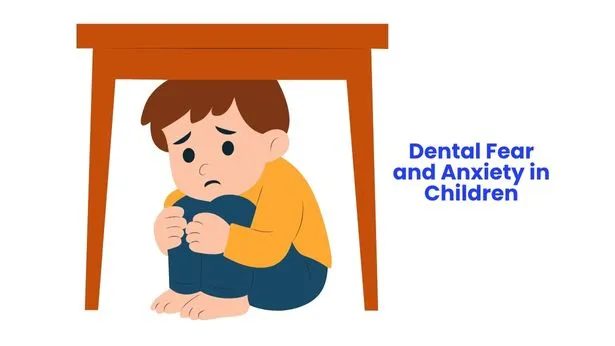How Pediatric Dentistry Helps Children with Dental Anxiety
Finding the ideal pediatric dentist for anxious kids is a priority for parents wanting to provide their children the gentle, effective dental care without fear and distress. Many children experience dental anxiety. Fortunately, pediatric dentistry provides different modalities for young patients to be comfortable, safe, and confident receiving care. Knowing more about how pediatric dentists can reduce anxiety for children can empower parents and caregivers to manage the oral health of their children and ease their fears.
In this blog, we will discuss strategies that are effective in treatments by pediatric dentists, how to help a child with dental anxiety, how a child-friendly dentist can help with the fear of dentists, and how to practically reduce kids’ anxiety before a dentist visit. We will even explain the role of pediatric dental care for anxious and/or nervous children and how to convert an anxious experience to a positive experience with dental care.
What is Dental Anxiety in Children?

Dental anxiety relates to feelings of anxiety or fear related to going to the dentist, and ranges from mild anxiousness to extreme anxiety that keeps children from visiting the dentist at all. Dental anxiety can be caused by multiple factors – fear of pain, unfamiliar or anxiety-inducing environments, negative past experiences, hearing about scary dentist experiences, etc.
When dental anxiety exists untreated, it can lead to dental avoidance, continued dental decay, and increased difficulty in treatment. This is why it is important to find a pediatric dentist when you have a child who has dental anxiety, because pediatric dentists receive specialized training to recognize and react to these anxieties in children.
How to Help a Child with Dental Anxiety?
Pediatric dentists are specially trained to handle children who may be anxious about dental visits in ways that are gentle and supportive. Below are a few examples of how they do this.
1. Child-Friendly Environment: Pediatric dental offices use bright colours, toys, and friendly decorations to provide an environment that helps to put children more at ease.
2. Communication Techniques: Dentists will use simple, positive language and will then explain the procedure, incorporating kid-friendly terms to help alleviate fear of the unknown.
3. Tell-Show-Do: This method tells the child what will happen, shows the instruments, and then does the procedure with cooperation and acceptance from the child.
4. Distraction or Relaxation: Dentists will use videos, children’s music, or games during treatment, which help to divert attention away from the actual procedures.
5. Parental Involvement: Denying a child the opportunity to have a parent attend their appointment deprives them of comfort and a sense of security.
6. Sedation options: If a child is severely anxious, a pediatric dentist may offer sedation dentistry, which would qualify as a safe form of anxiety medication, to alleviate fear and would allow the dentist to complete dental treatment.
Overall, pediatric dentists utilize all of the examples outlined above to create an environment conducive to a trusting relationship with the child, and one that decreases anxiousness to improve the overall experience for both the child and the parent.
Child-Friendly Dentist for Fear of Dentists: What to Look For?
When choosing a dentist for kids with dental anxiety, parents should search for a dentist with features and services centered around a child’s emotional well-being.
1. Specialized training: Pediatric dentists have had extra training in how to manage children’s anxiety and behavior.
2. Gentle approach: Being a good listener, being patient, and listening and adjusting to what your child needs.
3. Positive Reinforcement: Using praise and rewards to encourage cooperation and build confidence.
4. Flexible Schedule: Shorter or staggered appointment times to prevent injury to your child.
5. Office Environment: A welcoming environment with toys, books, and staff experienced in working with anxious or nervous children.
6. Choosing a Dentist: A Dentist who has the above qualities would help ensure a positive experience that may help a child have a better view of going to the dentist.
Also Read: What Does A Pediatric Dentist Do?
Tips to Calm Kids Before a Dentist Visit
Parents can be an important part in reducing anxiety associated with dental visits by preparing their child before the appointment. Here are great tips to help calm kids before a dentist visit:
1. Use positive language around the dentist: Avoid any negative words, and think it is best not to share your anxieties. You can also say the dentist is just a friendly helper.
2. Read books or watch YouTube videos: Some great books are age-appropriate that children can read to familiarize themselves with visiting the dentist.
3. Practice pretend visits: Whether you practice a dental visit at home using a toothbrush and mirror during playtime. It will remind your child that they do not have to be scared of a visit.
4. Keep your meals and sleep routine before the visit: The more you can keep normal routines, along with sleep and meal time, the less anxiety and stress there will be going into the visit.
5. Bring extra comfort items: Allow your child to take along a special toy or blanket; this can help with transition.
6. Teach relaxation: Let your child try some simple deep breathing, or show them how to imagine being calm and relaxed as they visit the dentist.
These are all simple steps to help build trust in yourself and develop less fear, making the visit easier for not only the child but the parent, too.
Pediatric Dental Care for Nervous Children: Creating Positive Experiences
Comprehensive pediatric dental care for anxious children deals with more than just the clinical treatment; it encompasses clinical treatment and emotional support. Pediatric dentists want to create positive first experiences that would help children establish a lifetime of good oral health.
1. Early and Regular Visits: By starting dental visits at age one, children can become cognizant of the environment before a problem arises.
2. Tailored Care: Every child has their temperament and anxiousness, and we must adapt the treatment they receive to accommodate these factors.
3. Rapport: Developing a relationship so that children would feel safe and comfortable returning.
4. Education and Empowerment: Teaching children what their teeth are and what things they can do to and for their teeth will help alleviate fear and increase their sense of control.
The four characteristics work together with the aim of turning fear into confidence and developing a positive attitude towards dental health.
Final Call Over Dental Anxiety
Dental anxiety in children happens frequently and can be managed. It is important to find the right pediatric dentist for anxious kids and to know how to help a child with dental anxiety, which will all help the child have a more positive dental experience. Finding a child-friendly dentist with a fear of dentists, using tips to calm kids before a dentist visit, and using dedicated pediatric dental care for nervous children can help. With proper preparation and compassionate care, children can not only deal with their fears but also create habits that can last a lifetime.
If your child has a dental phobia, don’t wait to help. Reach out to a pediatric dentist who provides care for anxious kids to discover how expert care and individualized services can help to support your child’s comfort and dental health.
To work with a professional expert to find the best care, you can reach experienced pediatric dentist headhunters who will help provide the best match for your child’s needs. Reserve a visit, and it will be the first step to improving your child’s dental experience. Contact Hire Smiles to get started today!
FAQs on How Pediatric Dentistry Helps Children with Dental Anxiety
Q1. What are the common sources of dental anxiety in children?
The sources of dental anxiety in children often include fear of pain, an unfamiliar situation, experience, and scary stories they’ve heard.
Q2. How can I find a pediatric dentist for anxious kids?
Look for a dentist with pediatric-specific training, a welcoming, child-friendly office, and positive feedback from patients.
Q3. What are some tips to help calm kids before seeing the dentist?
Use positive language, present books/videos, role-play a dentist visit at home, allow the child to bring a comfort item, and teach breathing and relaxation techniques.
Q4. Can sedation dentistry help nervous children?
Yes, sedation can be safely used to help children who have a high degree of dental anxiety.
Q5. When should I take my child to a dentist?
The Canadian Dental Association recommends the first visit to the dentist by 1 year of age or within 6 months of the first tooth appearing.
Q6. What is the tell-show-do method of working with children?
The tell-show-do method is a technique where the dental provider explains the procedure to the child, shows the instruments of the procedure, and afterwards performs the treatment while the child has already made a plan for how it will happen.
Q7. Is it a good idea for parents to stay during the dental appointment?
For many kids, it is helpful to have their parents present in the room to support them, particularly when it is their first visit.
Q8. How can pediatric dental care provide a foundation to prevent anxiety and future anxiety?
Pediatric dental care, which includes positive and low-stress experiences with dental treatment early in life, builds trust and confidence during a dental visit.
Related Article: Top Skills Every Successful Pediatric Dentist Needs





